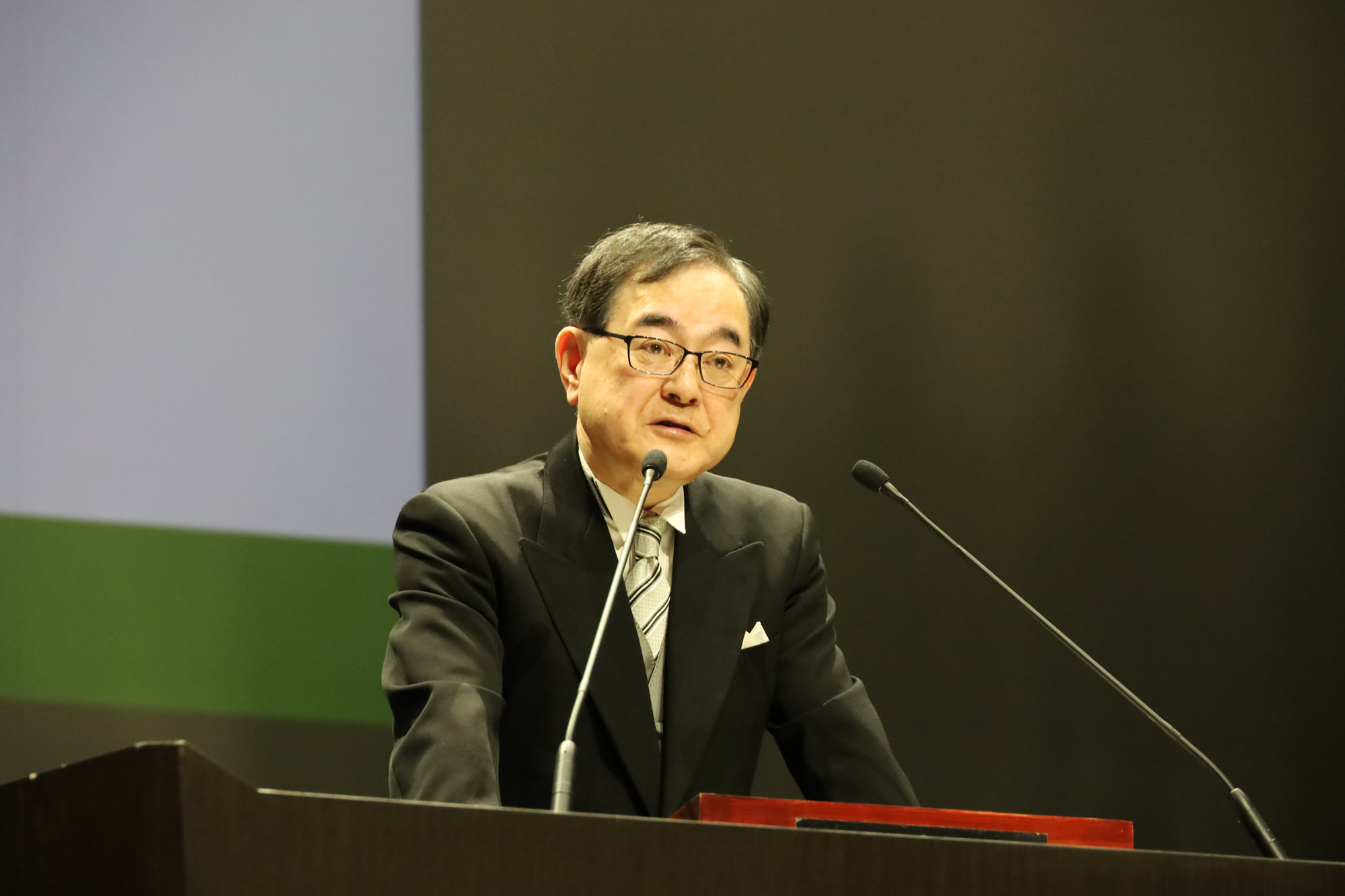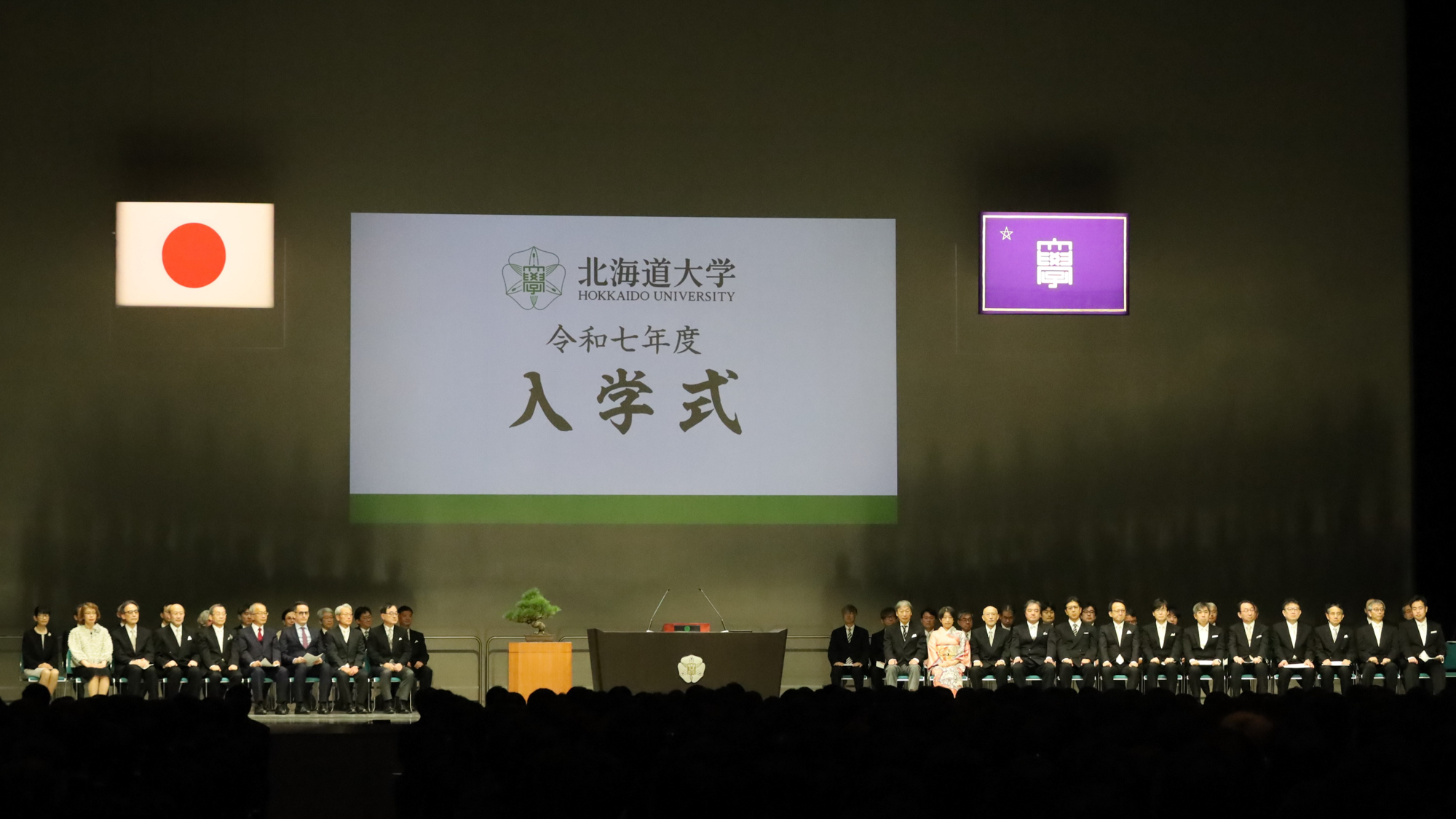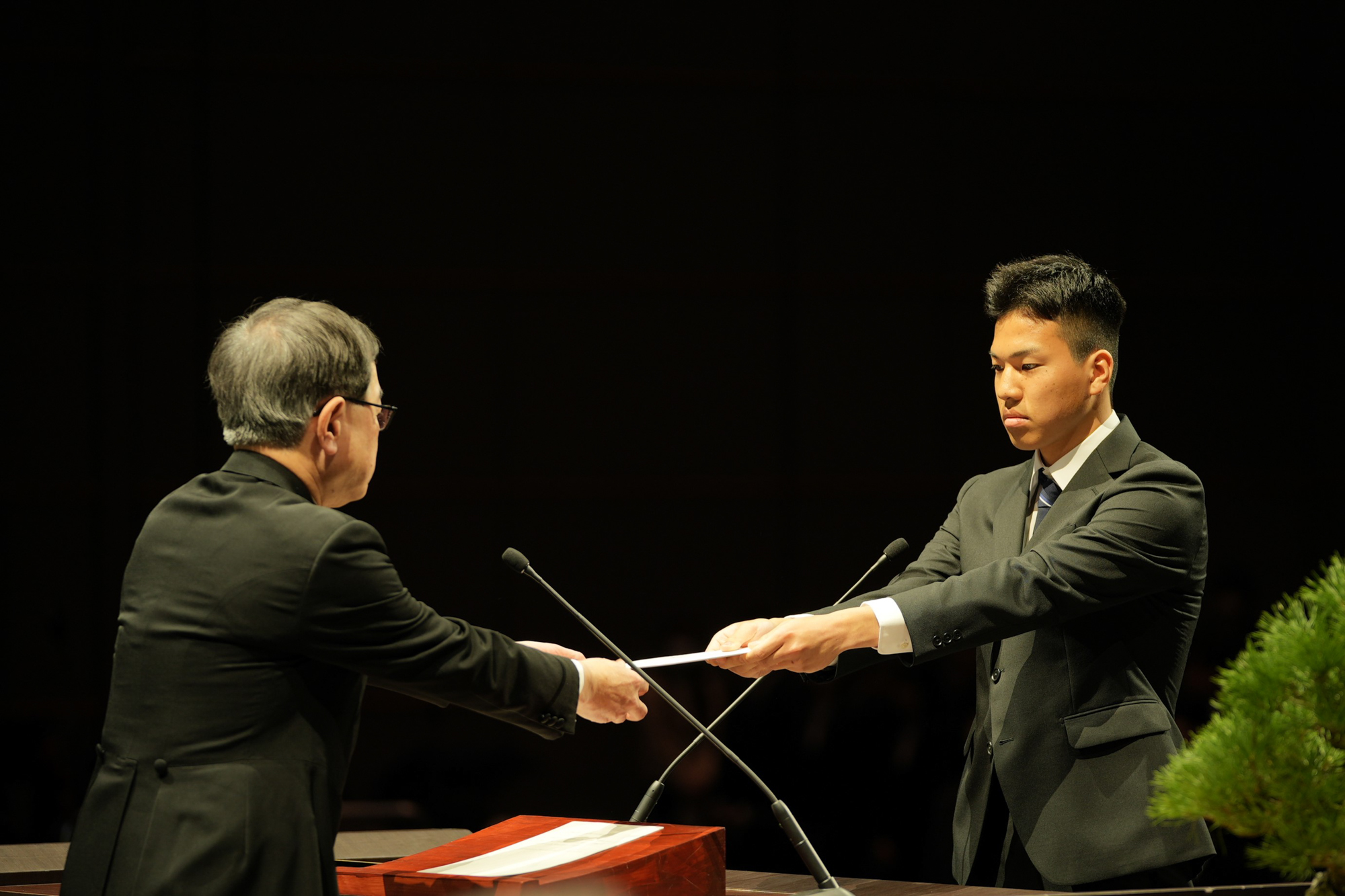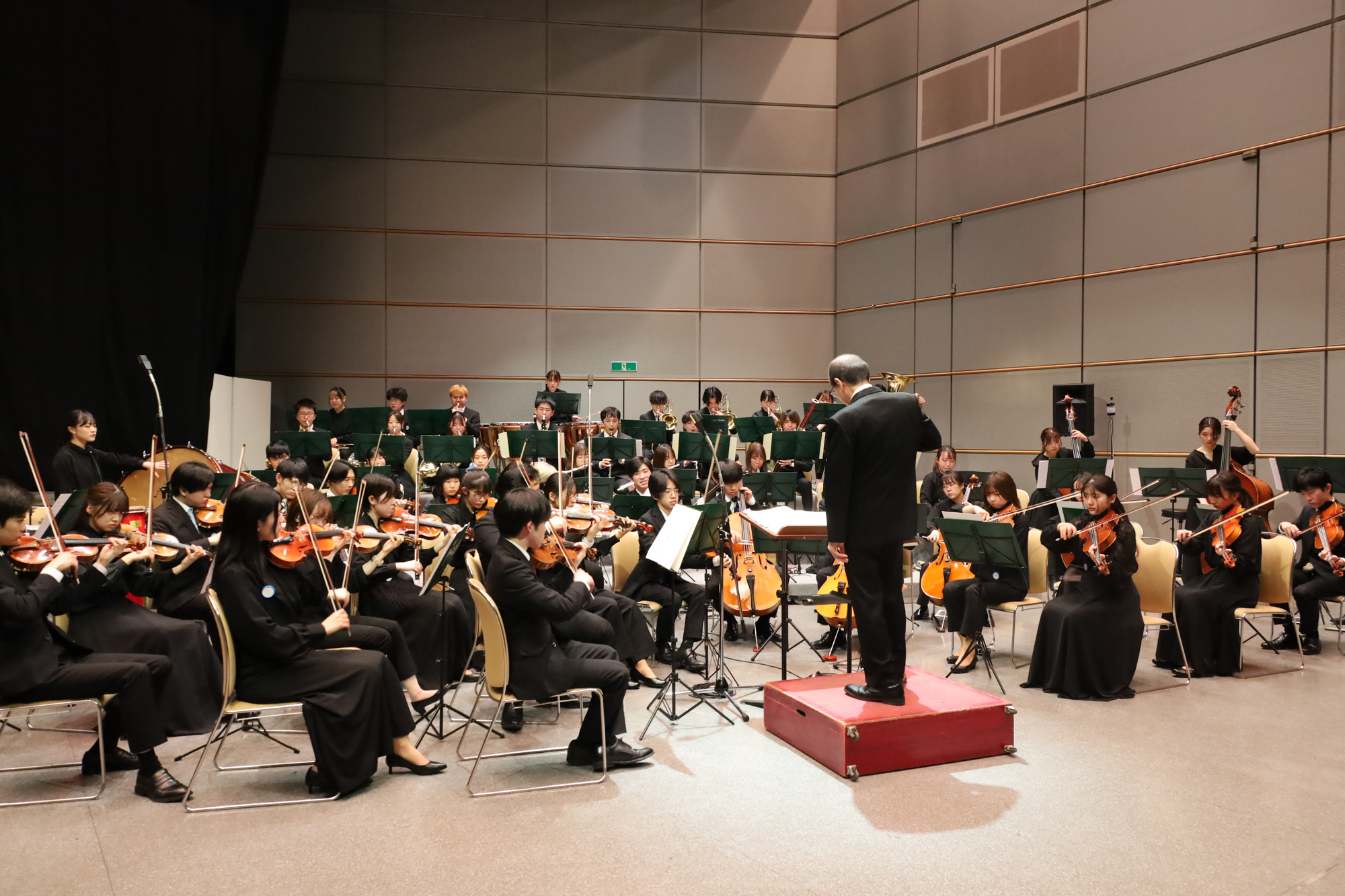Entrance Ceremony 2025: The President’s Welcome Address
University News | April 04, 2025
On behalf of Hokkaido University, please allow me to congratulate all 2,592 students who have just joined the university. I would also like to extend my thanks and congratulations to the many family members and friends who are here to celebrate with you.
In line with Hokkaido University’s renewed focus on social co-creation, we have invited representatives from companies such as ARCS COMPANY, LIMITED, SCSK HOKKAIDO CORP., Nitori Holdings Co., Ltd., Japan Airlines Co., Ltd., Hitachi, Ltd., HOKKAIDO GAS CO., LTD., The Hokkaido Shimbun Press, The Yomiuri Shimbun, and Rapidus Corporation. Officials from the local Hokkaido and Sapporo governments, and many donors who support our university are also in attendance today. Thank you for taking time out of your busy schedules to join us; we are honored to have you here.
Today, as we officially welcome our new students to this prestigious institution, I believe it is important to be aware of its history, understand the current meanings of the four basic philosophies it stands on, and learn about Dr. William S. Clark.
Let me begin by briefly explaining the history of Hokkaido University.
Looking back about 150 years to 1876, or year 9 of the Meiji Era, Japan was aiming to establish institutions of higher education comparable to the universities in Europe and the United States. It was in this climate that Hokkaido University’s predecessor, Sapporo Agricultural College, was established as one of the earliest institutions of its kind in Japan.
Sapporo Agricultural College offered an American-style liberal arts education, an education style that aimed to encompass a wide range of general education subjects. Sapporo Agricultural College did not only teach agriculture, as its name would suggest, but with the liberal arts education style at its foundation, its curriculum also included subjects ranging from math, chemistry, and biology to history and economics. What is even more impressive is that these subjects were all taught in English, which is exceptional even today. Hokkaido University continues to strengthen its foundation in international education, a foundation that was laid nearly 150 years ago at the establishment of Sapporo Agricultural College.
The Hokkaido University Sapporo campus is one of the largest and most diverse in Japan. With the beauty of each season on show, it is difficult to find a rival for such an attractive university campus in Japan. Additionally, including the Hakodate campus, many local research facilities, and Japan’s largest research forests, Hokkaido University covers the largest land area of any university in Japan.
Before our predecessor Sapporo Agricultural College was established, this land was settled by Ainu families and was a place they called home. I imagine it provided an abundant life for the Ainu people with fertile land, rich natural water, and astounding greenery. As we pursue our studies here, we should strive never to forget this history.
Some of you may have noticed the Godzilla theme song played during the opening of this ceremony. The composer of that theme song, the late Akira Ifukube, was a graduate of Hokkaido University. As one of the most famous composers of modern Japan, he created many pieces inspired by the Ainu culture and the natural beauty of Hokkaido.
Moving on to the second point I mentioned earlier, I would like to discuss the four basic philosophies of Hokkaido University. Since its foundation, while upholding its liberal arts style curriculum, Hokkaido University has also cultivated four basic philosophies: Frontier Spirit, which exemplifies the exploration of new academic fields; Global Perspective, which seeks to develop an international mindset and respect for diversity; All-Round Education, which cultivates the foundations of human development; and Practical Learning, which aims to give back the results of our research to society.
These four basic philosophies are wonderful, but they may not seem particularly special to you. I, too, believe they are not meant to be special — they should rather be the norm. However, today, the value of these four principles is being challenged. I would like to speak about this in the context of the major global crisis of values we are currently facing.
As I am sure you all can sense, the world is currently on the cusp of change. For example, the traditional values of international cooperation and globalization, which seek to bring about peace and prosperity by encouraging diversity of different values and beliefs, are being scrutinized.
Just a moment ago, I introduced Hokkaido University’s four basic philosophies, one of them being Global Perspective, which seeks to develop an international mindset and respect for diversity. Until recently, I believed that this philosophy was timeless, yet in the current geopolitical climate, one wonders if it will survive.
Another challenge we are facing is the crisis of research. Unfortunately, today’s world is increasingly filled with misinformation and intentional activities that contradict scientific fact. There are even movements that oppose the science-based SDGs concepts promoted by the United Nations and coordinated global efforts to combat climate change.
Embodying the philosophies of Frontier Spirit and Practical Learning, Hokkaido University offers an environment where students can learn and seek ways to resolve this significant crisis of values. Hokkaido University is home to 12 undergraduate and 21 graduate schools, making it the university offering the widest range of academic disciplines in Japan.
It is my desire that you who are enrolled here take full advantage of this splendid educational environment. Through diversity, global perspective, and practical learning in the pursuit of truth, you should be able to develop the ability to solve the significant crisis of values sweeping the world.
In the years to come, as you embark on your university studies, I encourage you to seek out knowledge across a broad range of disciplines and engage in developing your own liberal arts education. Hokkaido University provides an excellent environment and opportunities to do just that. However, your success is dependent upon how much you are willing to study on your own. I advise you not to let this invaluable chance slip by. From my experience, I believe the years after entering university will be among the best in your life. But whether you choose to make the most of this time depends entirely upon your self-discipline.
The third basic philosophy of Hokkaido University, All-Round Education, is all about providing students with the opportunity to learn various ways of thinking and to acquire knowledge across a wide range of subjects. Additionally, it aims to create an environment where students can meet diverse peers and mentors who will guide them on their journey.
Currently, about 70% of Hokkaido University students come from prefectures outside Hokkaido. In other words, this university attracts students from across Japan. A significant number of international students are also enrolled in our graduate schools. I believe that, in Japan, this level of regional diversity is unique to Hokkaido. I hope that you will have wonderful encounters with people of diverse backgrounds and make your time here “among the best in your life.”
Come April and May, many of you may feel a bit lonely as you adjust to life here, especially since, for most of you, this is your first time living away from home. However, I believe that you can overcome this hardship and make your years at Hokkaido University a truly rewarding chapter in your life.
Up to this point, I have shared with you that Hokkaido University’s four basic philosophies hold renewed and profound significance in today’s world — and that they are the values we must protect with our utmost effort.
Finally, there is one last thing that I would like to impart to you at this entrance ceremony, and that is the story of the first vice president of Hokkaido University, Dr. William Smith Clark.
About 150 years ago, Dr. Clark departed from his home in Boston, Massachusetts, where he held the important position of president of the Massachusetts Agricultural College. At the request of the Meiji government, he left the North American continent, set off from the west coast of the United States, and sailed across the Pacific. He arrived in Sapporo in 1876. Although we do not know the exact population of Sapporo at the time, it is estimated to have been around 2,000 people. Just thinking about all of this, I cannot help but imagine the many challenges he faced.
After accomplishing the monumental task of laying the foundation for Sapporo Agricultural College, he left Japan in a whirlwind, leaving behind a simple yet profoundly impactful message: “Be ambitious.”
By this, he must have been referring to the numerous challenges through which he persevered during his life. After all, his life was not only limited to academics and education; he was also a man of courage who worked to change the world. In today’s terminology, we might even call him an entrepreneur. The words of wisdom he left us were not only words of encouragement but also reflections of his soul, embodying something he continued to practice throughout his life.
At the behest of the Meiji government, Dr. Clark made it his ambition to establish modern agriculture in the cold northern region of Hokkaido. This was certainly one of the most ambitious challenges of its time.
Since then, a century and a half has passed. The challenge that Dr. Clark initially tackled has now evolved into the significant task of researching methods for stable and regenerative food production.
What is more, a second ambitious challenge is being set in the practical application of renewable energy as well as with the Hokkaido Digital Park concept, which focuses on the production of next-generation advanced semiconductors.
In this way, since the time of Dr. Clark, Hokkaido University has consistently pursued innovation and lived up to its reputation as an ambitious university.
Today, after this entrance ceremony, I encourage you to make the time to visit the famous bust of Dr. Clark near the central lawn and reflect on his life of challenges and ambition.
Here at Hokkaido University, we strive to be unparalleled in our endeavors and to carry on the spirit of Dr. Clark’s “Be Ambitious,” which has been passed down for 150 years. Again, I would like to extend my congratulations on your admission to this magnificent university.
Thank you.
Click the link below to read the transcription of the original Japanese address:
https://www.hokudai.ac.jp/president/greeting/21.html






